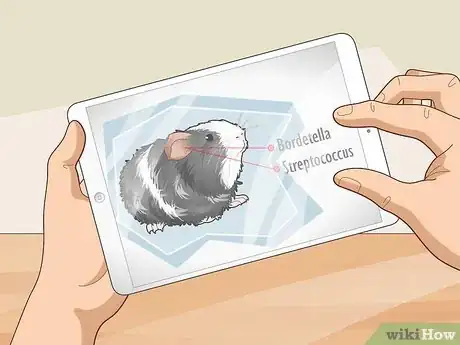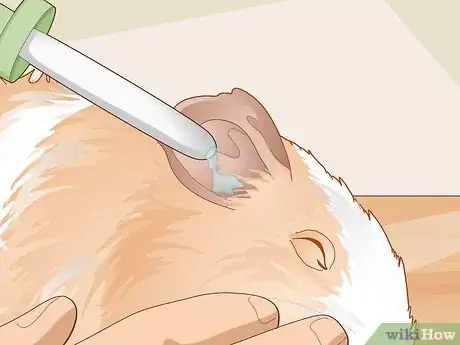wikiHow is a “wiki,” similar to Wikipedia, which means that many of our articles are co-written by multiple authors. To create this article, volunteer authors worked to edit and improve it over time.
There are 8 references cited in this article, which can be found at the bottom of the page.
This article has been viewed 22,486 times.
Learn more...
An ear infection is a medical condition that commonly occurs when a guinea pig is suffering from a bacterial infection, such as pneumonia or other respiratory diseases. Severe cases of an ear infection can affect the nervous system and cause inability to walk, rolling to one side, and head tilt.[1] As soon as you notice these symptoms, have your guinea pig diagnosed and treated by an exotic vet promptly.
Steps
Diagnosing Your Guinea Pig
-
1Understand the severity of an ear infection. Ear infections can occur as a result of a bacterial infection, such as pneumonia or other respiratory illnesses. If the ear infection spreads from the middle ear to the inner ear, it can become quite serious, even affecting parts of the nervous system.[2]
- An inner ear infection can cause symptoms like head tilt, walking in circles, inability to walk, loss of balance, and rolling onto the side.[3]
- Middle ear infections commonly have mild symptoms of respiratory illnesses, such as sneezing, discharge from the nose and ears, and wheezing.
-
2Look for physical symptoms of an ear infection. Ear infections are commonly the result of pneumonia and respiratory infections. You can expect to see sneezing, discharge from the nose, wheezing, loss of appetite, weight loss, and dullness in appearance.[4] The symptoms of an ear infection would be as follows:Advertisement
-
3Look for symptoms of a severe ear infection. The severity of your guinea pig's symptoms can change if the ear infection spreads from the middle ear to the inner ear. Your guinea pig will likely exhibit problems with the nervous system, which includes:
-
4Research the cause of an ear infection. As mentioned above, ear infections occur as a result of a bacterial infection, such as pneumonia or respiratory illness.
- Pneumonia and other respiratory diseases are caused by several bacteria, including Bordetella and Streptococcus. These bacteria tend to be 'opportunistic,' meaning they infect susceptible animals, multiply, and cause disease if the opportunity arises.[14]
- Some respiratory diseases are contagious and can be transmitted from one guinea pig to another through airborne transmission. Separate sick guinea pigs from their herd as soon as possible.[15]
-
5Set up an appointment with an exotic vet. A diagnosis can only be rendered by a qualified veterinarian. Your vet will observe clinical symptoms exhibited by your guinea pig to determine if the infection has spread to the middle ear and/or examine your guinea pig's blood and discharge to identify the infectious agent responsible for the ear infection.[16]
Caring for Your Guinea Pig
-
1Isolate your guinea pig as soon as possible. The best preventative for a guinea pig suffering from an ear infection is to isolate them to prevent the illness from spreading to other guinea pigs in the cage.
- Set up a temporary cage using a large cardboard box or a transportable enclosure. Line the base of the cage with towels and provide hay, pellets, and water.
-
2Contact your vet for treatment options. Medication such as ointments, local anaesthetic agents, and antibiotic ear drops will likely be administered by your veterinarian to relieve symptoms and provide temporary pain relief.[17]
- An antiseptic or antibiotic wash will be administered to remove discharge or buildup.[18]
-
3Follow the care advice provided by your veterinarian. Antibiotic drops will likely need to be administered 2-3 times a day at home. It's essential to listen and understand the advice given by your vet to effectively treat your guinea pig's ear infection and alleviate any illness and related symptoms.
- Ear drops should be administered by slightly tilting your guinea pig's head to the side, and holding their head in the same position after applying the medicine to prevent your guinea pig from shaking the drops out.[19]
- Your veterinarian may also administer oral antibiotics, which can be syringe-fed to your guinea pig by placing the syringe into the side of your guinea pig's mouth.
-
4Keep your guinea pig in a clean and quiet environment. Sanitising your guinea pig's cage for hygiene purposes is important to ensure an effective recovery, as an ear infection commonly occurs due to a bacterial infection. To promote a quick and healthy recovery, minimise stress by regulating the traffic around your guinea pig's cage and ensure the area stays quiet.
-
5Monitor your guinea pig's reaction to medication. Look for adverse side-effects that could be a result of a reaction to medication. For example, drooling, loose stools, loss of appetite, and a roughed up coat.
- If your guinea pig's symptoms worsen, take them to a vet as soon as possible.
Preventing Ear Infections in Guinea Pigs
-
1Maintain a clean cage. Ear infections can occur as a result of a bacterial illness through transmission. While pneumonia is airborne and often unpreventable, you can help prevent other respiratory diseases by cleaning your guinea pig's cage once a week at minimum.
- Maintaining a clean and sanitised living environment for your guinea pig will help reduce the levels of infectious organisms in their home.[20]
- Use an anti-bacterial (pet-friendly) cleaning product or a white vinegar solution to get rid of harmful bacteria.
- Practice spot-cleaning by scooping up droppings, replacing wet patches, and removing food debris to keep the bedding fresher between washes.
-
2Wash your hands before handling. Bacteria that cause respiratory illnesses can be transmitted to your guinea pig through contact. This is generally the case if you have more than one household pet, as animals like cats, dogs, and rabbits can carry harmful bacteria.[21]
- Wash your hands for 20 to 30 seconds with soap and warm water.
-
3Keep your guinea pigs separate from other animals. Common household pets such as cats, dogs, rabbits, hamsters, and mice can carry bacteria that cause ear infections while being asymptomatic (seeming healthy).[22]
- Do not introduce your pets to each other and do not house your guinea pig with other species.
-
4Feed your guinea pig a balanced diet. Vitamin C deficiency (otherwise known as scurvy) can lead to increased susceptibility to bacterial infections. To prevent scurvy, ensure your guinea pig is getting enough vitamin C through their vegetables and pellets.
- Bell peppers (or capsicums) can be fed on a daily basis due to their high vitamin C content. Other vitamin C enriched vegetables include parsley, spinach, kale, broccoli, and cauliflower.[23]
- Look for adult guinea pig pellets that are fortified with vitamin C. Oxbow adult guinea pig pellets are vet recommended and should be fed to your guinea pig in 1/8 cup servings each day.
- Ask your vet for vitamin C supplements. Water drops and nutrient blocks that can be found commercially in pet stores are not recommended unless a veterinarian advises you to supplement your guinea pigs vitamin C. Ideally, your guinea pig should be consuming enough vitamin C from their vegetables and pellets.
Warnings
- If your guinea pig's symptoms worsen, take them to the vet immediately.⧼thumbs_response⧽
- Look for adverse side-effects to medication, which need to be treated promptly.⧼thumbs_response⧽
References
- ↑ https://www.petmd.com/exotic/conditions/ears/c_ex_gp_ear_infections
- ↑ https://www.petmd.com/exotic/conditions/ears/c_ex_gp_ear_infections
- ↑ https://www.petmd.com/exotic/conditions/ears/c_ex_gp_ear_infections
- ↑ https://www.petmd.com/exotic/conditions/respiratory/c_ex_gp_streptococcosis
- ↑ https://www.petmd.com/exotic/conditions/ears/c_ex_gp_ear_infections
- ↑ https://www.petmd.com/exotic/conditions/ears/c_ex_gp_ear_infections
- ↑ https://www.petmd.com/exotic/conditions/ears/c_ex_gp_ear_infections
- ↑ https://www.petmd.com/exotic/conditions/ears/c_ex_gp_ear_infections
- ↑ https://www.petmd.com/exotic/conditions/respiratory/c_ex_gp_streptococcosis
- ↑ https://www.petmd.com/exotic/conditions/ears/c_ex_gp_ear_infections
- ↑ https://www.petmd.com/exotic/conditions/ears/c_ex_gp_ear_infections
- ↑ https://www.petmd.com/exotic/conditions/ears/c_ex_gp_ear_infections
- ↑ https://www.petmd.com/exotic/conditions/ears/c_ex_gp_ear_infections
- ↑ https://vcahospitals.com/know-your-pet/guinea-pigs-problems
- ↑ https://www.petmd.com/exotic/conditions/respiratory/c_ex_gp_bordetella_bronchisepta_infection
- ↑ https://www.petmd.com/exotic/conditions/ears/c_ex_gp_ear_infections
- ↑ https://www.petmd.com/exotic/conditions/ears/c_ex_gp_ear_infections?page=2
- ↑ https://www.petmd.com/exotic/conditions/ears/c_ex_gp_ear_infections?page=2
- ↑ https://www.pets4homes.co.uk/pet-advice/how-to-deal-with-ear-infections-in-guinea-pigs.html#
- ↑ https://www.petmd.com/exotic/conditions/ears/c_ex_gp_ear_infections?page=2
- ↑ https://www.petmd.com/exotic/conditions/respiratory/c_ex_gp_bordetella_bronchisepta_infection?page=2
- ↑ https://www.petmd.com/exotic/conditions/respiratory/c_ex_gp_bordetella_bronchisepta_infection?page=2
- ↑ https://www.guinealynx.info/diet_order-c.html







































































